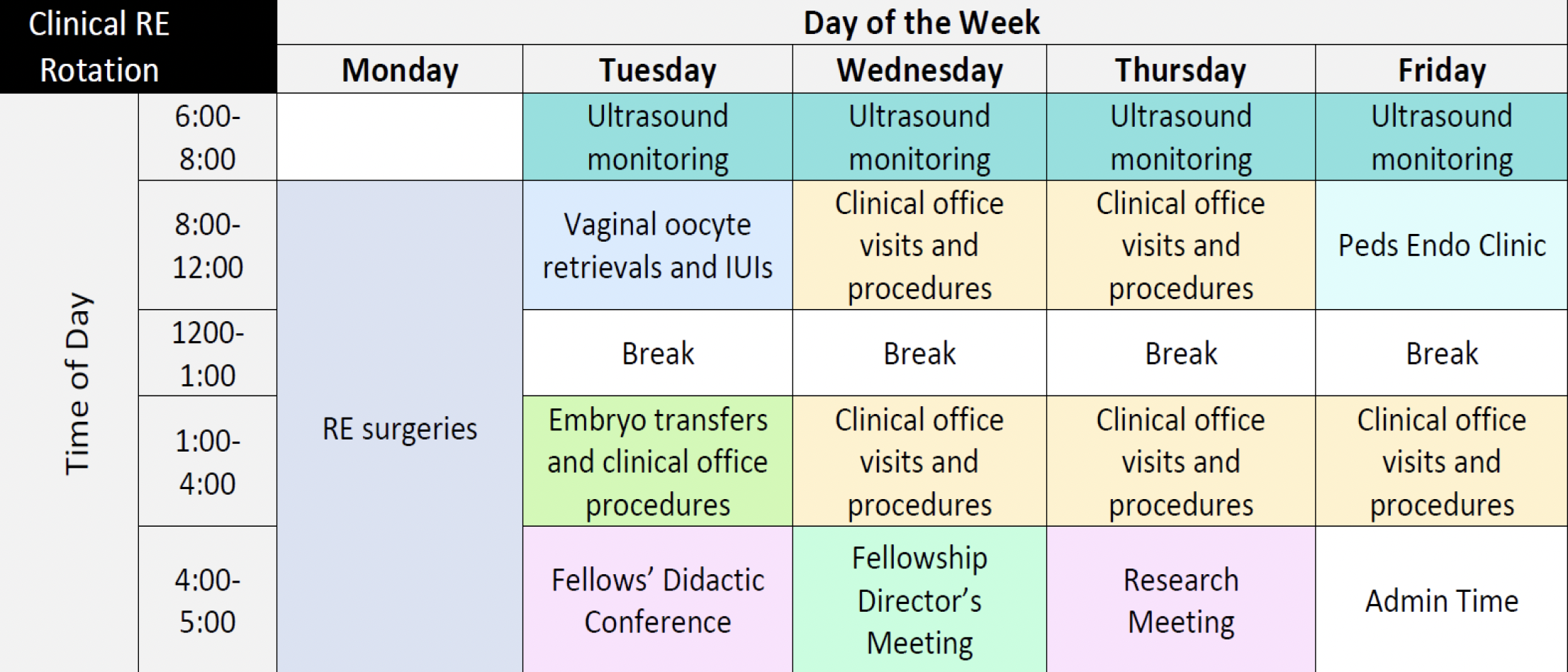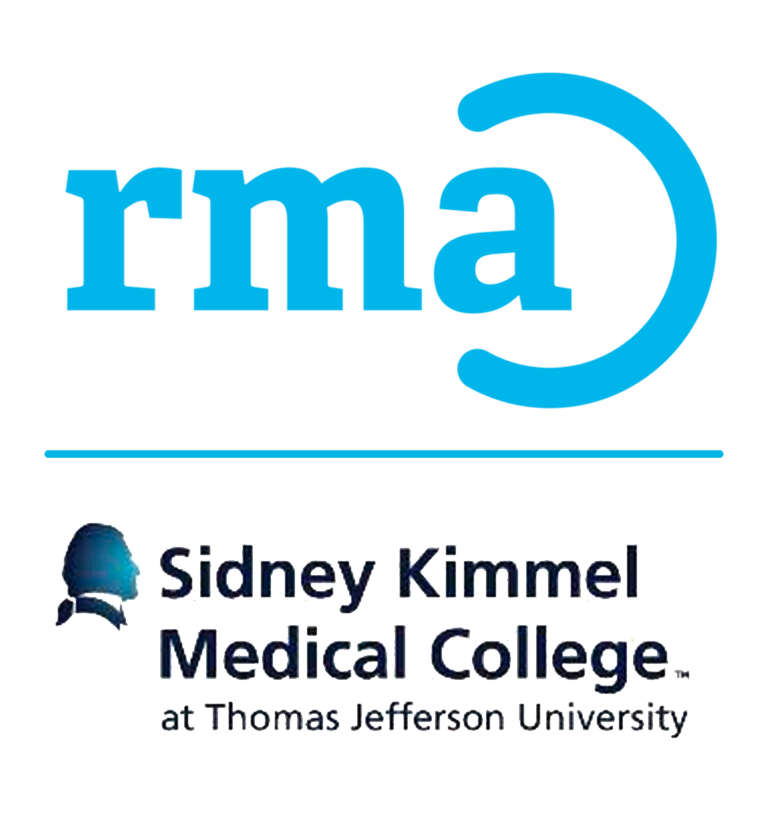FELLOWSHIP PHILOSOPHY & OVERVIEW
Fellowship Overview
The Sidney Kimmel Medical College of Thomas Jefferson University clinical program is diverse and provides care to patients with issues that span the full breadth of Reproductive Endocrinology.
Our educational philosophy is based on five core elements:
- Comprehensive clinical training.
- Academic breadth in all areas of reproductive medicine.
- Critical knowledge and skills regarding human embryology and ART laboratories.
- Opportunities to design, execute, and publish large prospective clinical studies.
- Access to state-of-the-art molecular techniques to complete research in the areas of human gamete and embryo biology.

Colleagues & Collaboration
Collaboration and chemistry with our team is critical and a part of what makes our fellowship…
Learn More

Fellowships Rotations & Calendar
There are four fundamental types of rotations in the Jefferson-RMA…
Learn More

The First Year
Depending on the academic year there will be 1-2 first year fellows that both start with a clinical…
Learn More

Call Schedule and Duties
Our fellows are focused on clinical care, academics, and research…
Learn More

Conference Schedule
The Fellows Didactic Conference takes place every Tuesday afternoon for two hours…
Learn More

Research Meetings
Once a week the Research team will meet to discuss ongoing and future clinical and basic science projects…
Learn More
Colleagues and Collaboration
Collaboration and chemistry with our team is critical and a part of what makes our fellowship special. We expect that you’ll have fun every day working and learning alongside global leaders in the research and treatment of infertility.
This program offers the ability to focus on the specific area of medicine you’ve chosen as being the most interesting to you and with people just as committed to excellence. Providing good care and attaining good outcomes, completing interesting research projects, traveling and presenting your work, and working with great people is a major benefit of our fellowship program.
Fellowship Rotations & Calendar
There are four fundamental types of rotations in the Jefferson-RMA Reproductive Endocrinology and Infertility Fellowship program:
While formal research rotations do not begin until the second year, fellows will be provided the opportunity to participate in research beginning July 1 of their first year. The calendar of rotations is as follows:
The First Year
Depending on the academic year there will be up to 3 first year fellows that will start their clinical rotation. The fellows’ first year will consist of ten months of clinical reproductive endocrinology and infertility under the guidance of Dr. Marie Werner and our REI faculty. During this rotation the fellows will have Urology exposure with Dr. Philip Cheng. This is combined with one month in the clinical andrology and endocrinology laboratory, and one month of embryology laboratory experience. During the first year, the daily schedule for the fellows will consist of shared morning ART monitoring which will start at 6 AM each weekday morning.

Call Schedule & Duties
Our fellows are focused on clinical care, academics, and research in the area of Reproductive Endocrinology. Call is limited to the area of Reproductive Endocrinology only with no in-house call or general OB-GYN call of any kind. Additionally the fellows will not be used to staff general OB-GYN clinics at any time unlike many other fellowships around the US.
The first and second year fellows alternate responsibility for nighttime “beeper” call, principally to answer basic questions after hours, typically every other week. This call is taken from home and only involves going into the hospital on very rare occasions, approximately twice a year. The fellow on call will be responsible for participating in emergency procedures done at night or on weekends and will be assisted by one of the attending physicians. The first and second year fellows will work every other weekend from 6 AM to approximately 12 PM, performing scans, inseminations, and evaluating acute situations as they arise. The on call fellow will get one day off the week after taking weekend call.
Conference Schedule
The Fellows Didactic Conference takes place every Tuesday afternoon for two hours. All fellows and attendings are expected to participate, and present a topic which follows the knowledge guidelines provided by ABOG for Reproductive Endocrine training. During each academic year we also strive to invite influential guests in the field of reproductive medicine to give lectures on impactful research in our field. During the past academic year we had 8 such invited guests all from different institutions around the world.
Invited lecturers have come from the following institutions:
- University of California San Francisco
- Penn State College of Medicine
- Feinberg School of Medicine, Northwestern University
- University of Iowa
- Duke University School of Medicine
- Yale School of Medicine
- Wildlife Reproductive Medicine Division at the Leibniz Institute for Zoo and Wildlife Research
- University of California, Riverside
- Pediatric Endocrinology Division at Morristown Medical Center
- Hospital of the University of Pennsylvania
- Tufts Medical Center
- University of Kansas Medical Center
- Columbia University Medical Center
- Hackensack University Medical Center
- Michigan State University Department of Animal Sciences
- Harvard Medical School
- Center for Assisted Reproduction, Texas
- Robert Wood Johnson Medical School
- University of North Carolina School of Medicine
- University of Michigan
- Massachusetts General Hospital
- New York University Langone Health
- E.N.E.R.A. Reproductive medicine Centre, ITALY
- National Institutes of Health
- University of North Carolina School of Medicine
- University of California at Los Angeles UCLA
- Sanford Health Fertility & Reproductive Medicine
- Vios Fertility Institute
- Rutgers, Robert Wood Johnson Medical School
- University of Utah School of Medicine
- Sexual Medicine, Reconstructive Urology, & Cancer Survivorship AtlantiCare Regional Medical Center
- Wake Forest Baptist Medical Center
- Jefferson University
- Boston IVF
- Austin Fertility & Reproductive Medicine/Westlake IVF (AFRM)
- IVI, Spain
- University of Pittsburgh School of Medicine
Research Meetings
Once a week the Research team (interested physicians, all fellows, PhDs, research personnel) will meet to discuss ongoing and future clinical and basic science projects, statistical analysis, and manuscript preparation. Once a week all fellows will also meet with the fellowship director and associate program directors.


